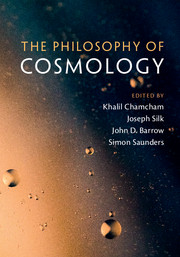Book contents
- Frontmatter
- Contents
- List of Contributors
- Preface
- Acknowledgments
- Part I Issues in the Philosophy of Cosmology
- 1 The Domain of Cosmology and the Testing of Cosmological Theories
- 2 Black Holes, Cosmology and the Passage of Time: Three Problems at the Limits of Science
- 3 Moving Boundaries? – Comments on the Relationship Between Philosophy and Cosmology
- 4 On the Question Why There Exists Something Rather Than Nothing
- Part II Structures in the Universe and the Structure of Modern Cosmology
- Part III Foundations of Cosmology: Gravity and the Quantum
- Part IV Quantum Foundations and Quantum Gravity
- Part V Methodological and Philosophical Issues
- Index
- References
3 - Moving Boundaries? – Comments on the Relationship Between Philosophy and Cosmology
from Part I - Issues in the Philosophy of Cosmology
Published online by Cambridge University Press: 18 April 2017
- Frontmatter
- Contents
- List of Contributors
- Preface
- Acknowledgments
- Part I Issues in the Philosophy of Cosmology
- 1 The Domain of Cosmology and the Testing of Cosmological Theories
- 2 Black Holes, Cosmology and the Passage of Time: Three Problems at the Limits of Science
- 3 Moving Boundaries? – Comments on the Relationship Between Philosophy and Cosmology
- 4 On the Question Why There Exists Something Rather Than Nothing
- Part II Structures in the Universe and the Structure of Modern Cosmology
- Part III Foundations of Cosmology: Gravity and the Quantum
- Part IV Quantum Foundations and Quantum Gravity
- Part V Methodological and Philosophical Issues
- Index
- References
Summary
Introduction
A popular account of the development of science, in particular of cosmology, and of the relation between science and philosophy goes like this: Science is inherently progressive and ever extends our knowledge. Step by step, phenomena at smaller and larger scales become known to us. Philosophy, by contrast, is concerned with those questions that we cannot (yet) answer in a scientific way due to a lack of empirical evidence. Accordingly, as science progresses, the boundary between the sciences and philosophy shifts. As a result, philosophy continuously loses ground, thus becoming more and more marginal – or so the view is. The aim of this comment is to discuss this account of science and philosophy with a special emphasis on cosmology.
A Popular Story About the Development of Science and Philosophy
Let us first unfold the popular story in more detail. There is quite a lot to support it. Early attempts to account for the natural world and to explain the observed phenomena, e.g. in ancient Greece, were fraught with speculation. There was simply no alternative, since, in modern terms, background knowledge was small and data sparse. Accordingly, to the extent that there was natural science, it was speculative and in this sense philosophical. Philosophy and the natural sciences were not, and could not be, properly distinguished, as is evident e.g. from the fact that a renowned philosopher, viz. Plato, wrote a dialogue concerned with what we now call cosmology.
Given the lack of knowledge and data, it is no surprise that there were rival views on how the world is composed and how far it extends. As to the small scales, there was controversy as to whether the natural world is built out of tiny, indivisible bodies, as the atomists claimed. There were competing views about the largest scales too: Whereas the atomists favoured an infinite world, the school that gained predominance for quite some time claimed that the Universe was finite and consisted largely of what is now considered to be the solar system (consult Kragh (2007) for a history of cosmology).
After the so-called Scientific Revolution, and particularly during the twentieth century, our knowledge of the natural world has rapidly increased.
- Type
- Chapter
- Information
- The Philosophy of Cosmology , pp. 66 - 75Publisher: Cambridge University PressPrint publication year: 2017

